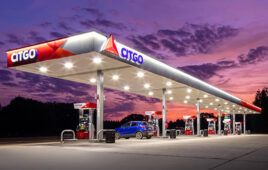The influx of people moving to western North Carolina from the Northeast and Florida—both areas where Dunkin’ Donuts does a booming business—was one reason Citizens Fuel Co. is excited these days to be adding Dunkin’ franchises to at least three of its 10 Citi Stop c-stores.
“We felt it was a huge opportunity to fill a void for those consumers and to introduce Dunkin’ to our other customers as well,” said Citizens’ Vice President Scott Shealy.
The move was an extremely smart one.
Response has exceeded Citizens’ pro forma numbers. Parking is frequently at a premium and customer lines often spill out the door at the company’s first Dunkin’ location, which opened in mid-November. At its second location near the fabled Biltmore House, where Dunkin’ replaced a deli service, employees report a steady stream of potential donut buyers came into the store from the moment the “coming soon” sign went up.
“Consumer feedback has been outstanding and we’re very excited about the possibilities,” Shealy said.
Doughnuts, however, weren’t the principal reason for re-launching the Dunkin brand—which departed the market more than 10 years ago—smack in the heart of Krispy Kreme land. “Dunkin’s business model is anchored by their beverage program, particularly in New England and Florida, which fits right in with the demographic changes we’re seeing here,” Shealy said. “People who like Krispy are very passionate, as are people who like Dunkin’. That’s probably not going to change, but the Krispy menu lacks the beverage component that Dunkin’ has.”
Citizens’ locations are among the few Dunkin’ franchises in North Carolina that offer the complete Dunkin’ line, which now includes Fair Trade-certified espresso drinks, flatbread sandwiches and personal pizzas as well as donuts and its extensive beverage menu.
Peer Study Group Helpful
Shealy, who joined one of consultant David Nelson’s peer study groups for non-competing members of the petroleum industry about seven years ago, says that feedback from other group members was also a major determining factor in choosing to add the Dunkin’ line.
Nelson group members share financial information monthly and act as each other’s outside boards of directors. Shealy’s group holds three meetings a year, two of which are at a member’s location, where the group tours facilities and offers collective feedback on the pros and cons they see.
The remainder of the meeting is spent going over financial information, benchmarking and focusing on issues group members collectively want to discuss and individual company issues.
“I think if you look at the “Who’s Who” in the convenience store industry, most of them are probably involved with one of David’s groups,” Shealy observed.
After a Massachusetts-based member introduced Dunkin’ Donuts to his group three years ago, Shealy began considering the company for his units. When doughnut and coffee chain announced it was going to begin developing franchises in the Charlotte area a few months later, Shealy attended an open house and asked about getting a franchise.
Persistence Paid Off
Dunkin’, it seemed, wasn’t quite ready to re-enter the mountains—a hesitation that didn’t deter Shealy from calling company officials every few months. Nearly a year and a half later his persistence paid off and Citi Stop began the process of obtaining an agreement and opening its first Dunkin’ location.
Going forward, Shealy expects that one or two of Citizens’ current locations that have traditionally sold gas will find a new highest and best use. In fact, the company’s third Dunkin’ location, scheduled to open next spring, will actually replace an existing gasoline and c-store.




